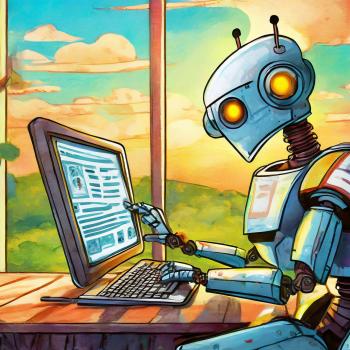
Introduction
Last week, I discussed the way technology enhances our temptations. One of my readers immediately suggested that as a complement to discussing the seven deadly sins I should also discuss the seven capital virtues, and the effect technology has there.
I confess I had not given much thought to the virtue side of the equation. I understand that this is a significant lapse, but one shared by a lot of people. We’re drawn to the negative. Still, how could anyone imagine that they’re being intellectually honest if they only consider one side of an argument? In my defense this is a very LDS/Mormon way of looking at things.
In LDS cosmology, the foundational event of our current existence is the Council in Heaven. In this council, two plans were offered: Satan’s plan and Jesus’ plan.
Satan’s plan involved forcing everyone to be righteous, thereby saving everyone.
Jesus’ plan maintained our agency; we would be allowed to be wicked, but as a consequence he would act as redeemer for those who sinned.
Technology seems to “create” virtue by taking a page from Satan’s playbook: forcing virtue upon us, rather than revealing and enhancing inner virtue. This is the sort of thing I was alluding to in the last post when I said: “Violence is down because of the vastly increased power of the state.”
All of which is to ask: Does virtue count if it’s forced virtue?
This is a crucial question best saved for a later post. That said, your reaction to this piece will depend in large part on your answer. For myself I would say: somewhat. Certainly the decrease in violence matters to those who might have otherwise been its victims. But if the only thing keeping violence at bay is an external force—one that could conceivably change, weaken, or even disappear entirely—then surely that has to be taken into account, even if someone is entirely focused on outcomes.
With all that in mind, let’s examine some virtues. We’ll start with the seven Capital Christian virtues, codified back in the sixth century simultaneously with the seven deadly sins.
The Seven Capital Virtues
Chastity
Much has been made of the recent decrease in teen pregnancy and youth promiscuity more broadly, and certainly technology has played a role with both. But at the same time we’re seeing a decrease in dating, an increase in pornography consumption, and a plummeting birthrate. All of things are also directly related to technology. Certainly it could be argued that all of this is a form of chastity, but is it a form of chastity in the same way that sitting at home and watching sports is a form of health? Sure you never risk the serious injuries that can accompany actual participation in sports, but you don’t receive any of the strength or cardiovascular benefits either. Just as health does not consist of never being injured, chastity is not the same as sterility. We want to be in good shape even if we risk injury. And we should want children even if it results in some additional promiscuity. With fertility collapsing all over the developed world, children are the one thing we don’t have.
Temperance
Everyone seems to agree on one thing: Technology equals MORE. As temperance is synonymous with moderation, this is not a virtue technology has enhanced.
Charity
There is a prima facie case to be made that technology has vastly enhanced the virtue of charity. To begin with, the material abundance produced by technology might be said to be the most amazing charitable endeavor ever, albeit a very diffuse one. If you’re interested in more direct charity you can now help people anywhere in the world—specifically targeting the greatest suffering—something that was unthinkable a few centuries ago. Per capita giving is up as well. One could make the argument that the increase in this virtue was enough to overshadow failings everywhere else. Still, while this may not be forced virtue, it might nevertheless count as inadvertent virtue. Also one is reminded of the widow and her mite. While charity may be increasing, is it keeping pace with the actual increase in our abundance?
Diligence
This virtue is the opposite of sloth. And while I made the case last time that sloth was increasing, there is certainly a case to be made that we’re working harder than ever as well. In fact we’re frequently told that historically people worked less. Technology allows us to work all the time and everywhere. Though it’s telling that no one looks at our workload and the type of work we do and describes it as the pinnacle of virtue.
Kindness
Does anyone think we’re suffering from an overabundance of kindness or that technology has made us more kind? If anything, it’s the exact opposite. Barack Obama talked about an empathy deficit all the way back in 2006. Since then, it’s only gotten worse with the creation of social media and a massive increase in political polarization.
Patience
Patience is the opposite of wrath, and when I discussed wrath in the last post I mentioned that while anger seems to have increased, violence has decreased. This made the case for an increase in wrath muddy. However if you view wrath as the opposite of patience the case becomes much stronger, because we are definitely not patient. Technology has completely destroyed our patience. As someone who’s pretty impatient myself, I’m not sure I’d put this virtue up there with charity, but, still, it to whatever extent you do value it, technology has certainly not enhanced it.
Humility
A trend of valuing the individual instead of valuing the group has been going on for decades. Technology has allowed it to reach its full flowering in a culture of rampant self-promotion, all enabled by social media. While there may be some corresponding increase in humility elsewhere to offset this vanity explosion. I haven’t come across it.
Some Other Virtues
Faith
If you’re looking for faith in traditional religions, which is certainly what this meant historically, then there’s less of it than ever. If you’re looking for faith more broadly than there’s quite a lot of it. There’s faith in progress, there’s faith in destruction (global warming), there’s faith in a wide variety of principles, from social justice, to the virtues of the market. To the extent you’re talking about traditional faith, technology and progress have diminished it. To the extent you’re talking about all forms of faith, it’s certainly increased the variety. It remains to be seen whether that’s a good thing.
Hope
There’s a lot of catastrophizing out there. I’ve engaged in quite a bit of it myself. But technology has undeniably provided a lot of hope. The most extreme example of this is transhumanism. Its adherents hope that technology will essentially provide everything: immortality, functional omniscience, perpetual joy, humanity spreading across the galaxy, and any other fantastic dream you imagine. But even those who aren’t transhumanists dream of cures for cancer, increasing luxury, and better entertainment. I for one hope they’re right and that the future will be amazing. But I also see a lot of cause for concern, including all of the things from this post and the last.
Love
These days the definition of love has gotten pretty messy. And it’s often synonymous with infinite tolerance. Which is not, I think, our ancestors would have meant by the term. So I’m sure that by the current definition of love, we emphasize it more than ever. But I’m not sure it’s the same virtue or even a virtue. Also increasingly it seems to be one of those virtues which is forced upon us.
Justice
Another reader suggested the virtue of justice. He pointed out that “we no longer hang people for theft of £.1, as we did pre-Industrial Revolution or for being black as we did in the 1930s.” That technology and progress have made us more just. I agree, sort of. I think this takes us full circle back to the point I made at the beginning about whether forced virtue is actually virtue. Also there is a tension between justice and mercy, and in another venue I spent 5,000 words arguing that in our quest for perfectly tuned justice that we have lost sight of mercy. I don’t have the space to recapitulate that all here, but I will grant that on some very important metrics that we are more just.
Conclusion
One of my all time favorite quotes is from Edward O. Wilson:
The real problem of humanity is the following: We have Paleolithic emotions, medieval institutions and godlike technology. And it is terrifically dangerous, and it is now approaching a point of crisis overall.
Religious definitions of virtues (and vices) represent those medieval institutions, and to their credit they did a halfway decent job of dealing with our Paleolithic emotions. But now godlike technology is leveling all in it’s path, attempting to pave over both our medieval institutions and our Paleolithic emotions. This endeavor, while awesome in it’s scope, seems unlikely to be successful. As Wilson points out we’re approaching a point of crisis, and it’s unclear how it’s going to play out. But however it does, we going to need as much virtue as we can get.












